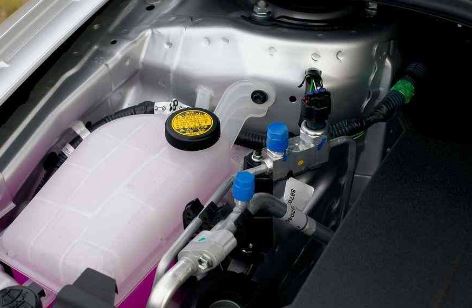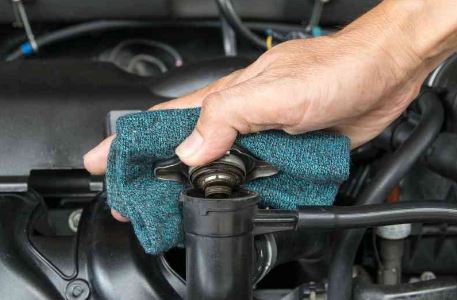Excessive pressure in a cooling system can be a serious problem for any vehicle. The cooling system is in charge of keeping the engine at a safe operating temperature, and when the pressure in the system rises, it can result in a number of problems that may ultimately result in engine failure.
One of the main causes of excessive pressure in a cooling system is a malfunctioning radiator cap. When the cap fails to maintain the correct pressure, it can cause the coolant to boil and create pressure in the system. This can lead to leaks, blown head gaskets, and even cracked engine blocks.
Another common cause of excessive pressure in a cooling system is a malfunctioning thermostat. The thermostat controls how much coolant flows through the system, and if it malfunctions, the system could get too pressured. If this is not corrected right away, the engine could overheat and sustain catastrophic damage.
Causes of Excessive Pressure in Cooling System

Excessive pressure in a vehicle’s cooling system can lead to a range of problems, from leaks to engine damage. Understanding the causes of this issue can help drivers identify and address problems before they become serious. Here are some of the most common causes of excessive pressure in a cooling system:
Thermostat Failure
The thermostat is responsible for regulating the flow of coolant through the engine. If it fails, it can cause the coolant to become trapped in the engine, leading to a buildup of pressure. This can cause leaks and other issues, and can even lead to engine damage if left untreated.
Water Pump Failure
If it fails, it can cause the coolant to become stagnant, leading to a buildup of pressure. This can cause leaks and other issues, and can even lead to engine damage if left untreated.
Clogged Radiator or Coolant Lines
If the radiator or coolant lines become clogged, it can cause the coolant to become trapped in the engine, leading to a buildup of pressure. This can cause leaks and other issues, and can even lead to engine damage if left untreated.
Head Gasket Failure
The head gasket is responsible for sealing the engine’s combustion chamber. If it fails, it can cause coolant to leak into the engine, leading to a buildup of pressure. This can cause leaks and other issues, and can even lead to engine damage if left untreated.
In conclusion, understanding the causes of excessive pressure in a cooling system can help drivers identify and address problems before they become serious. By keeping an eye out for these common issues and addressing them promptly, drivers can ensure that their vehicle’s cooling system remains in good working order.
Symptoms of Excessive Pressure in Cooling System

Excessive pressure in the cooling system can cause various symptoms that indicate a problem. To stop further harm to the engine, it’s critical to recognize these symptoms as soon as possible. They can range in severity from mild to severe. Here are some of the common symptoms of excessive pressure in the cooling system:
Overheating Engine
One of the most common symptoms of excessive pressure in the cooling system is an overheating engine. An overheating engine can cause the cylinder head to warp, which can result in a blown head gasket or cracked cylinder head.
Coolant Leaks
Another symptom of excessive pressure in the cooling system is coolant leaks. When the cooling system’s pressure is too high, the coolant may leak from the radiator, hoses, or other parts. Coolant leaks can cause the engine to overheat, and if left unchecked, can cause serious damage to the engine.
White Smoke from Exhaust
Excessive pressure in the cooling system can also cause white smoke to come from the exhaust. This is a sign that coolant is getting into the combustion chamber, which can cause damage to the engine. White smoke from the exhaust can also be a sign of a blown head gasket or cracked cylinder head.
Low Coolant Levels
Low coolant levels can also be a symptom of excessive pressure in the cooling system. If the cooling system’s pressure is too high, the coolant may escape, resulting in low coolant levels. Low coolant levels can lead to the engine overheating, which could seriously harm it.
Overall, excessive pressure in the cooling system can cause a range of symptoms that indicate a problem. It is important to identify these symptoms early and take the necessary steps to prevent further damage to the engine.
Effects of Excessive Pressure in Cooling System
Excessive pressure in a car’s cooling system can cause a range of negative effects. This section will explore some of the most common consequences of high cooling system pressure.
Engine Damage
One of the most serious effects of excessive pressure in a cooling system is engine damage. Overheating can lead to warped cylinder heads, damaged pistons, and even a cracked engine block. These types of repairs can be extremely expensive, and in some cases, the engine may need to be replaced entirely.
Reduced Fuel Efficiency
Another consequence of excessive pressure in the cooling system is reduced fuel efficiency. When the engine is overheating, it has to work harder to maintain its normal operating temperature. This extra work requires more fuel, which can lead to decreased fuel efficiency. Over time, this can add up to significant increases in fuel costs.
Expensive Repairs
In addition to engine damage, excessive pressure in the cooling system can also lead to other expensive repairs. For example, if the radiator or other components of the cooling system fail due to the high pressure, they will need to be replaced. In some cases, replacing these components can be very costly.
To avoid these negative effects, it’s important to ensure that the cooling system is functioning properly and that the pressure is within the manufacturer’s recommended range. Regular maintenance and inspections can help prevent excessive pressure and other cooling system issues.
Prevention of Excessive Pressure in Cooling System
Excessive pressure in the cooling system can cause serious damage to the engine, leading to costly repairs. Regular maintenance, coolant flushes, and replacing faulty parts can prevent excessive pressure buildup and keep the cooling system running smoothly.
Regular Maintenance
Regular maintenance is crucial to preventing excessive pressure in the cooling system. This includes checking the coolant level, inspecting hoses and belts for wear and tear, and ensuring that the radiator is clean and free of debris. It is recommended to have a professional mechanic perform a thorough inspection of the cooling system at least once a year.
Coolant Flushes
Coolant flushes are an important part of preventing excessive pressure in the cooling system. Over time, coolant can become contaminated with rust, sediment, and other debris, which can clog the system and cause pressure buildup. It is recommended to have the coolant flushed and replaced every 30,000 miles or every 3 years, whichever comes first.
Replacing Faulty Parts
Faulty parts in the cooling system can also contribute to excessive pressure buildup. This includes a malfunctioning thermostat, a damaged radiator cap, or a defective water pump. It is important to replace these parts as soon as possible to prevent further damage to the engine.
In summary, preventing excessive pressure in the cooling system requires regular maintenance, coolant flushes, and replacing faulty parts. By following these steps, drivers can ensure that their vehicles run smoothly and avoid costly repairs down the road.
FAQs About Too Much Pressure in Cooling System
What are the signs of excessive pressure in a cooling system?
Some common signs of excessive pressure in a cooling system include coolant leaks, coolant overflow from the reservoir, bubbling or gurgling sounds coming from the radiator, erratic temperature gauge readings, and even coolant spraying out from the radiator cap when it’s removed.
Why is excessive pressure in a cooling system a concern?
Excessive pressure in a cooling system can be a cause for concern because it puts additional stress on various components, such as hoses, gaskets, and seals. This increased pressure can lead to leaks, coolant loss, engine overheating, and potential engine damage if not addressed promptly.
How can excessive pressure be diagnosed in a cooling system?
To diagnose excessive pressure, a cooling system pressure test can be performed. This test involves using a pressure tester to pressurize the cooling system to the recommended pressure level. If the pressure rises rapidly or exceeds the normal range, it indicates the presence of excessive pressure.
How can excessive pressure in a cooling system be resolved?
The specific resolution depends on the underlying cause. Common solutions include checking and replacing a faulty radiator cap, inspecting and replacing a malfunctioning thermostat, flushing the cooling system to remove any blockages, repairing a blown head gasket, and ensuring proper coolant levels. It is recommended to consult a qualified mechanic for accurate diagnosis and repairs.
Can excessive pressure damage the engine?
Yes, excessive pressure in a cooling system can potentially damage the engine. The increased pressure can cause coolant leaks, leading to inadequate cooling and engine overheating. If the issue is not resolved promptly, it can result in engine damage, such as warped cylinder heads, cracked engine blocks, or damaged pistons.
How can I prevent excessive pressure in my cooling system?
Regular maintenance is key to preventing excessive pressure in a cooling system. Ensure that the cooling system is flushed and filled with the recommended coolant at the recommended intervals. Check and replace the radiator cap if necessary, and address any cooling system issues promptly to prevent them from escalating and causing excessive pressure.
Is it safe to drive with excessive pressure in the cooling system?
It is generally not recommended to drive with excessive pressure in the cooling system. Continuing to drive in this condition can lead to engine overheating, potential engine damage, and increased risk of a breakdown. It’s advisable to address the issue promptly and have the cooling system inspected and repaired before driving the vehicle.
Final Thought
In the end, excessive pressure in a cooling system can have detrimental effects on the overall performance and longevity of the system. The cooling system plays a vital role in maintaining optimal operating temperatures for various components of a machinery or vehicle. However, when the pressure within the system exceeds its recommended limits, it can lead to a range of issues.
One of the primary concerns of excessive pressure is the potential for damage to the cooling system itself. Components such as hoses, gaskets, and seals may fail under high pressure, resulting in leaks and loss of coolant. These leaks can lead to insufficient cooling, overheating, and potential engine damage if left unaddressed.
Related Topics:
- Can You Lubricate Timing Belt
- transmission assembly lube alternative
- Car Parts That Need Lubrication
- How to Lubricate Steering Column
- How Much Engine Assembly Lube To Use
- How to Lubricate Sliding Windows
- Is Silicone Spray a Dry Lubricant
- Will Silicone Damage Car Paint
- Fuel Pump Won’t Turn On With Ignition
- How Do Automatic Lubrication Systems Work
- How to Lubricate Sliding Windows


